
Lester Alvin Burnett, better known as Smiley Burnette, was an American country music performer and a comedic actor in Western films and on radio and TV, playing sidekick to Gene Autry, Roy Rogers, and other B-movie cowboys. He was also a prolific singer-songwriter who is reported to have played proficiently over 100 musical instruments, sometimes more than one simultaneously. His career, beginning in 1934, spanned four decades, including a regular role on CBS-TV's Petticoat Junction in the 1960s.

The Phantom Empire is a 1935 American Western serial film directed by Otto Brower and B. Reeves Eason and starring Gene Autry, Frankie Darro, and Betsy King Ross. This 12-chapter Mascot Pictures serial combined the Western, musical and science-fiction genres. The duration of the first episode is 30 minutes, while that of the rest is about 20 minutes. The serial film is about a singing cowboy who stumbles upon an ancient subterranean civilization living beneath his own ranch that becomes corrupted by unscrupulous greedy speculators from the surface. In 1940, a 70-minute feature film edited from the serial was released under the titles Radio Ranch or Men with Steel Faces. This was Gene Autry's first starring role, playing himself as a singing cowboy. It is considered to be the first science-fiction Western.

Red River Valley, later retitled Man of the Frontier for American television screening, is a 1936 American Western film directed by B. Reeves Eason and starring Gene Autry, Smiley Burnette, and Frances Grant. Written by Dorrell and Stuart E. McGowan, the film is about a "ditch rider" and his sidekick who set out to find out who has been causing the accidents at a dam construction site.

The Big Show is a 1936 American Western musical film directed by Mack V. Wright and starring Gene Autry, Kay Hughes, and Smiley Burnette. Written by Dorrell and Stuart E. McGowan, the film is about a singing cowboy who confuses two girls by being himself and his own stunt double at the Texas Centennial in Dallas. Roy Rogers appears in the film as one of the Sons of the Pioneers.
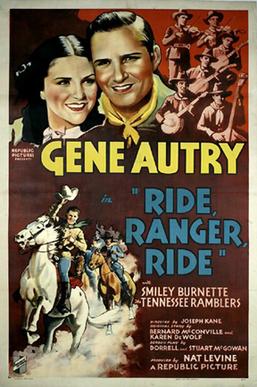
Ride Ranger Ride is a 1936 American Western film directed by Joseph Kane and starring Gene Autry, Smiley Burnette, and Kay Hughes. Based on a story by Bernard McConville and Karen DeWolf, and a screenplay by Dorrell and Stuart E. McGowan, the film is about a Texas Ranger working undercover to protect an Army wagon train full of ammunition and supplies. The Army doesn't believe him at first, until the Comanche arrive.
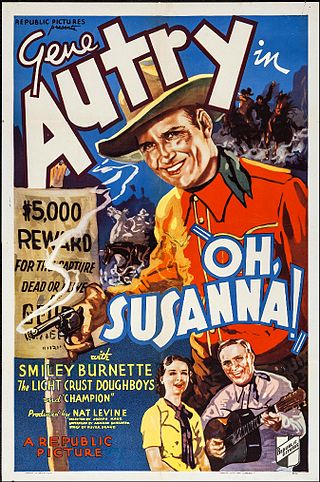
Oh, Susanna! is a 1936 American Western film directed by Joseph Kane and starring Gene Autry, Smiley Burnette, and Frances Grant. Written by Oliver Drake, the film is about a cowboy who is robbed and then thrown from a train by an escaped murderer who then takes on the cowboy's identity.
Round-Up Time in Texas is a 1937 American Western film directed by Joseph Kane and written by Oliver Drake. The film stars Gene Autry, Smiley Burnette, and Maxine Doyle. Despite its title, the majority of the film takes place in South Africa.

Public Cowboy No. 1 is a 1937 American Western film directed by Joseph Kane and starring Gene Autry, Smiley Burnette, and Ann Rutherford. Based on a story by Bernard McConville, the film is about a singing cowboy who chases down rustlers who are using airplanes, shortwave radios, and refrigerated trucks to steal cattle.

Man from Music Mountain is a 1938 American Western film directed by Joseph Kane and starring Gene Autry, Smiley Burnette, and Carol Hughes. Written by Betty Burbridge and Luci Ward, based on a story by Bernard McConville.
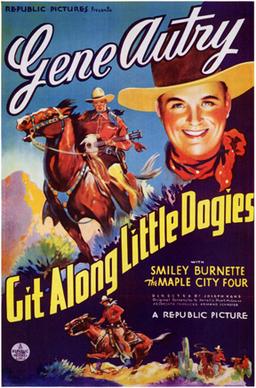
Git Along Little Dogies is a 1937 American Western film directed by Joseph Kane and starring Gene Autry, Smiley Burnette, and the Maple City Four. Written by Dorrell and Stuart E. McGowan, the film is about a singing cowboy who gets caught up in a war between oilmen and cattle ranchers, taking the side of the ranchers until he learns that oil will bring a railroad to town. The film is also known as Serenade of the West in the United Kingdom.

The Singing Vagabond is a 1935 American Western film directed by Carl Pierson and starring Gene Autry, Ann Rutherford, and Smiley Burnette. Written by Oliver Drake and Betty Burbridge, the film is about a cowboy who rides to the rescue when badguys kidnap a beautiful woman.

The Singing Cowboy is a 1936 American Western film directed by Mack V. Wright and starring Gene Autry, Smiley Burnette, Lois Wilde and Lon Chaney Jr. Based on a story by Tom Gibson, the film is about a cowboy who decides to sing on television in order to raise money for the orphaned daughter of his former boss who was murdered.
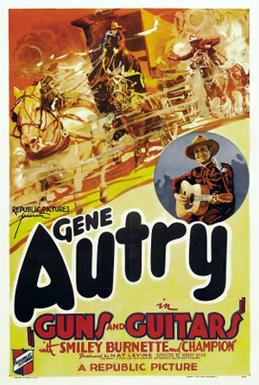
Guns and Guitars is a 1936 American Western film directed by Joseph Kane and starring Gene Autry, Smiley Burnette, and Dorothy Dix in her final film appearance. Written by Dorrell and Stuart E. McGowan, the film is about a singing cowboy who helps protect a county from fever-ridden cattle, and after being framed for murdering the sheriff, proves his innocence, gets elected sheriff, and then goes after the bad guy.

Rootin' Tootin' Rhythm is a 1937 American Western film directed by Mack V. Wright and starring Gene Autry, Smiley Burnette, and Armida. Based on a story by Johnston McCulley, the film is about two cowboys who assume the identities of dead outlaws in order to stop a bunch of cattle rustlers, later discovering that the outlaws are far from dead.

Yodelin' Kid from Pine Ridge is a 1937 American Western film directed by Joseph Kane and starring Gene Autry, Smiley Burnette, and Betty Bronson. Based on a story by Jack Natteford, the film is about the son of a Southeastern cattleman who becomes entangled in a war between the cattlemen and "turpentiners" who make their living harvesting pine tree sap.
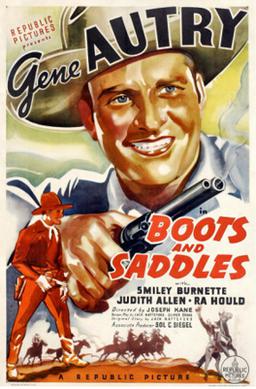
Boots and Saddles is a 1937 American western film directed by Joseph Kane and starring Gene Autry, Smiley Burnette and Judith Allen. It was produced and distributed by Republic Pictures. Based on a story by Jack Natteford, the film is about a young Englishman who inherits a ranch that he wants to sell, but is turned into a real Westerner by a singing cowboy.

Colorado Sunset is a 1939 American Western film directed by George Sherman and starring Gene Autry, Smiley Burnette, and June Storey. Written by Betty Burbridge and Stanley Roberts, based on a story by Luci Ward and Jack Natteford, the film is about a singing cowboy and his buddies who discover that the ranch they bought is really a dairy farm—and worse, it's subject to intimidation from a protection racket that prevents dairy products from safely reaching the market.
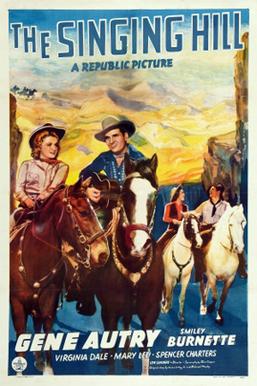
The Singing Hill is a 1941 American western film directed by Lew Landers and starring Gene Autry, Smiley Burnette, and Virginia Dale. Based on a story by Jesse Lasky Jr. and Richard Murphy, the film is about a singing cowboy and foreman of a ranch that may be sold to an unscrupulous banker by the young madcap heiress who is unaware that the sale will result in the local ranchers losing their free grazing land and their ranches. In the film, Autry performed the 1940 song "Blueberry Hill", first recorded by Sammy Kaye, which would become a standard recorded by such artists as Louis Armstrong (1949), Fats Domino (1956), and Elvis Presley (1957). The song became one of Autry's best-selling recordings. In 1987, "Blueberry Hill" received an ASCAP Award for Most Performed Feature Film Standards on TV.
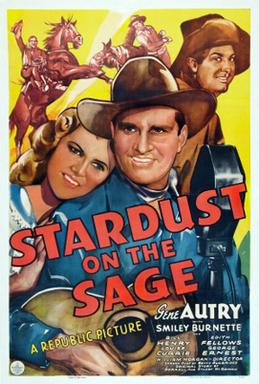
Stardust on the Sage is a 1942 American Western film directed by William Morgan and starring Gene Autry, Smiley Burnette, William Henry, and Edith Fellows. Written by Betty Burbridge, based on a story by Dorrell and Stuart E. McGowan, the film is about a singing cowboy who helps his fellow ranchers against a corrupt mine superintendent looking to steal the mine in which they've invested. The film soundtrack features two duets by Autry and Fellows, "When the Roses Bloom Again" and "I'll Never Let You Go, Little Darlin'". The final scene includes an innovative audience sing-along medley of the classics "You Are My Sunshine", "Home on the Range", and "Deep in the Heart of Texas", with Burnette conducting and the words appearing at the bottom of the screen.
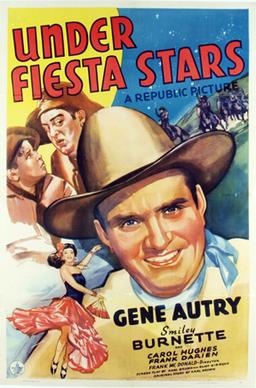
Under Fiesta Stars is a 1941 American western film directed by Frank McDonald and starring Gene Autry, Smiley Burnette, and Carol Hughes. Based on a story by Karl Brown, the film is about a singing cowboy and rodeo champion who inherits a ranch and mining property along with his foster father's niece. She wants to sell but needs his consent, and he wants to work the mine according to his foster father's wishes. Problems arise when the niece unwittingly gets involved with unscrupulous lawyers who are plotting to steal the mine. The film features the songs "Purple Sage in the Twilight", "When You're Smiling", and the title song.



















